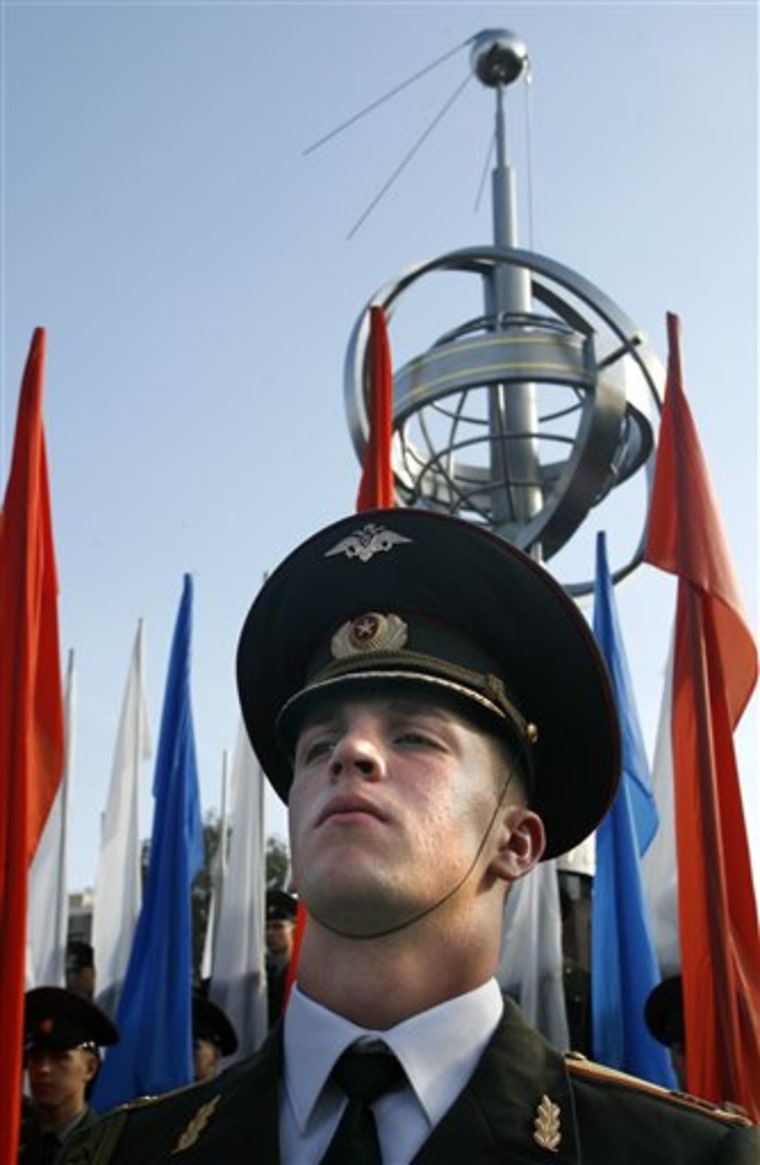Goose-stepping guards and medal-bedecked space veterans laid flowers at the Kremlin wall tomb of the father of the Soviet space program Thursday as Russia celebrated the 50th anniversary of the launch of Sputnik, the world’s first artificial satellite.
The name of Sergei Korolyov, the visionary rocket scientist whose brains and determination made it possible for the Soviet Union to thrust open the door to the space age, was a top state secret during his lifetime. It became known only became known after he died and was given a lavish state funeral.
“We take a rightful pride in the fact that it was our nation which opened the way to the stars for humanity,” President Vladimir Putin said in a statement.
Ceremonies were held at the Russia’s cosmonaut training center, Star City, outside Moscow, and engineers gathered at the Academy of Sciences to recall the events leading up to the Oct. 4, 1957, launch of the 184-pound (84-kilogram) metal ball with the spiked antennas that beeped as it orbited the Earth.
Engineers who worked on Sputnik’s launch recalled that they did not immediately fathom the impact of their achievement.
Its launch “sparked an unexpected furor around the world. No one expected this, even including our engineers,” Viktor Frusmon, a co-worker of Korolyov’s, said in a televised comments.
Stunning the world
The success of Soviet engineers stunned the world, and the launch was followed just four years later by another historic achievement — the voyage of Yuri Gagarin, the first human in space.
Sputnik galvanized the United States to pour money into space research and technology with the goal of landing a man on the moon — an event that occurred in 1969.
“The Sputnik accomplishment by the Russian people was responsible for the creation of the American space program,” said NASA Administrator Michael Griffin, who hailed Russia’s space achievements in a speech before space veterans and scientists.
After decades of rivalry, Russia and the United States have developed a close cooperation in space. Russian spacecraft now ferry crews and cargo to the international space station, and the two nations also cooperate on other missions.
On Wednesday, Griffin and Russian Space Agency chief Anatoly Perminov signed an agreement to put Russian scientific instruments on board U.S. probes that would be sent to the moon and Mars to search for potential water deposits.
“We have much learned from each other, and I think we can go father together than either of us can go separately,” Griffin said.
In recent years, the Kremlin has used some of Russia’s booming oil revenues to revive the nation’s space program which had experienced a severe funding shortage amid the post-Soviet economic turmoil.
“The space program is back in the focus of government’s attention,” Russia’s lower house speaker Boris Gryzlov said on a visit to a space factory.
